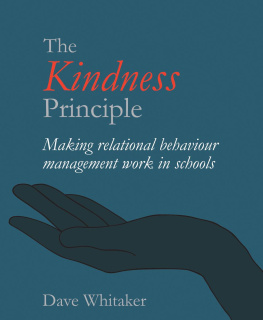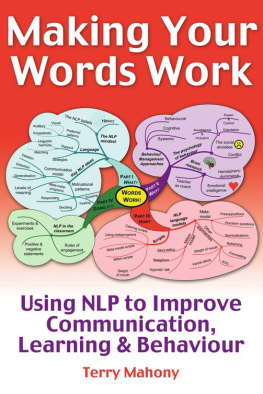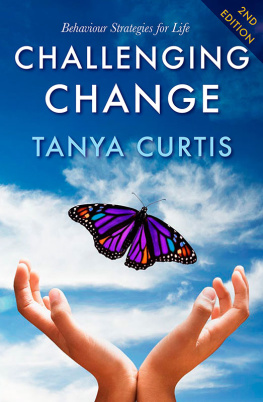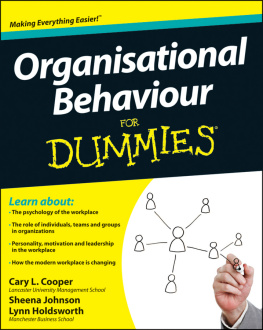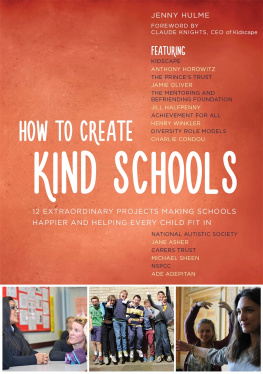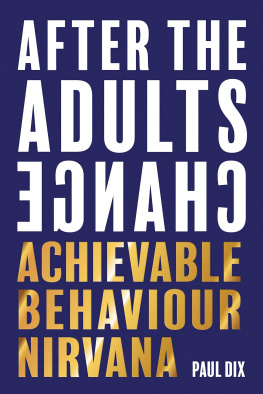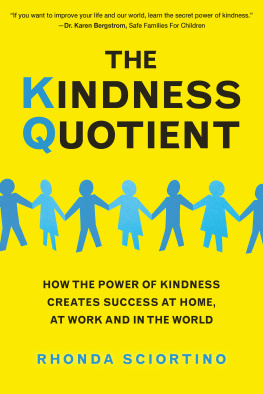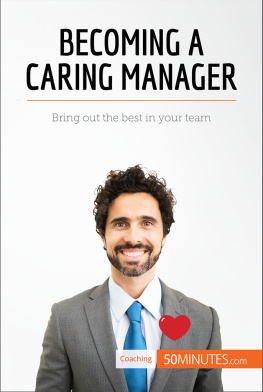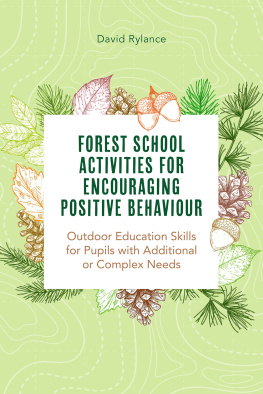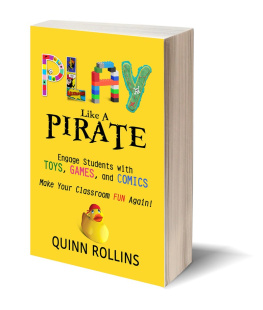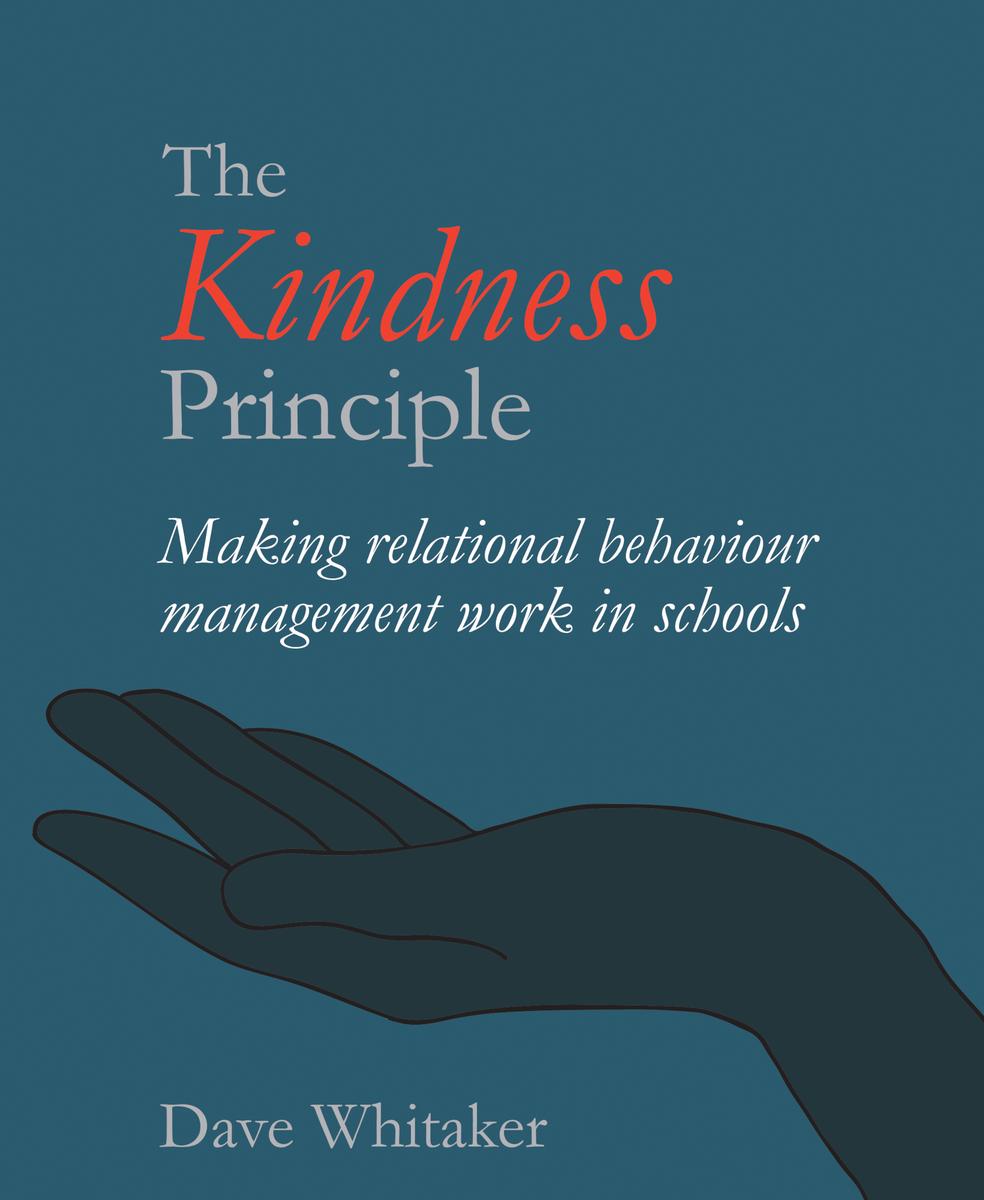Praise for The Kindness Principle
This is a wonderful book, which anyone who cares about children and young people will find compelling. It challenges so much of the current orthodoxy about macho no excuses school cultures and has lessons for us all about relationships and the impact of fear, humiliation and shame on young people.
Fiona Millar, education journalist, The Guardian
Dave Whitakers book is a game changer. Its a behaviour management book for teachers, support staff and school leaders written by someone who actually does it for a living whilst carrying themselves with credibility and integrity. This is no self-help book. Its a call to loving arms.
Hywel Roberts, teacher, writer, speaker and humorist
The Kindness Principle captures decades of Dave Whitakers thinking and experience in an inclusive and practical book.
Stephen Tierney, Chair, Headteachers Roundtable,
and author of Educating with Purpose
How can anyone object to kindness? Particularly when it comes to children. There are so many elements of this book that resonate: the need for adults to be their authentic selves with lived values, the power of recognition and intrinsic motivation, the value of play and co-constructed rules, the rigour of flexible consistency, the effect of seeing attention-seeking behaviour as attention-needing behaviour, and the fundamental problems of using fear and sanctions to control children and demand respect.
Fran Morgan, founder of Square Peg
Daves work is so much more than kindness: it is relational, successful and replicable. And what he shares in The Kindness Principle is unconditionally excellent and seriously useful.
Paul Dix, behaviour specialist, WhenTheAdultsChange.com
The Kindness Principle is a book I want to read again and again. Since reading the book, my interactions with dysregulated pupils have improved and my belief that kindness and relationships should be at the heart of every school has been strengthened.
Simon Kidwell, Head Teacher, Hartford Manor Primary School and Nursery B
Dave Whitakers The Kindness Principle is a book that speaks up for children and it is a really good read. It sheds light on the rituals, routines and habits of the school system and shares current research findings and practical advice to enable teachers and others in school to consider how best to give children every opportunity to succeed and to enjoy their education.
Mick Waters, Professor of Education, University of Wolverhampton
The Kindness Principle is a wonderfully crafted book that reminds us of the value and impact of kindness and authentic leadership in schools. Dave poses a series of provocations, encouraging the reader to consider the systems and leadership behaviours evident in their schools and challenges them to rethink them. A must-read for anyone who works with children and young people.
Kate Davies, CEO, White Woods Primary Academy Trust
In The Kindness Principle Dave takes us on a 25-year learning walk with a coherent philosophy of education, a characteristic humility and a sound grounding in neuroscience. Whether its practical insight into micro-structures and de-escalation, new knowledge on neurochemicals needed for learning, or the emotional resonances of tricky situations recounted with students and staff, the book shares a lot of powerful learning for educators and leaders at all levels.
Kiran Gill, CEO, The Difference
The Kindness Principle is a must-read book for enlightened educators which provides a practical guide to relationships-led practice. Between these covers, youll find everything you need in order to become a school where teachers love to teach, learners love to learn and where curiosity and empathy turn adversity into opportunity.
Dr Pooky Knightsmith, expert on child and adolescent mental health
In The Kindness Principle, Dave provides invaluable insights into the essential ingredients that shape successful behaviour management strategies in schools. I have known Dave for a decade and I believe that he is one of the wisest and most highly respected voices in this field.
Jon Chaloner, CEO, GLF Schools, Vice Chair, Headteachers Roundtable
Perhaps one of the greatest mistakes we can make in education is to see the virtue of kindness as somehow irrelevant or, worse still, weak. What Dave Whitakers beautiful book shows us is that the opposite is true.
Ben Walden, Director, Contender Charlie
This is for Josie she was a principal, she had strong principles
and she was kind. I wish she were here to read this book.
I feel very privileged to have been invited to write this foreword. Daves book is one of those rare gems: a really useful education book. It is a book that will take courage to read and even more courage to apply the approaches advocated within it.
I am not a teacher but, having talked to schools as a neurobiologist and paediatric neurologist for over three decades, it is my experience that almost all of the hundreds of teachers whom I have had the privilege to meet are motivated by a single desire: to do their best for the children and young people under their care. It is to that high ideal that this book gives fuel and substance. We sit at a time when education is being split into two halves: old-style Victorian teaching methods and modern methodologies based on compassion and understanding. As an observer it is hard, at the moment, to see how any commonality can be found between the two. This book lays out ways of thinking about education which any teacher can engage with and then apply to themselves and the children and young people in their care.
To each and every teacher reading this I would ask you to think carefully about the principles and discussions in this book. Ask yourself, are the premises sensible? Do they contain that one essential: common sense? I think that you will likely say, Well, yes. This all seems very sensible. I would agree. There is a depth of understanding in this book of how to successfully lead children and young people into that most important of things: self-motivated learning. It has always been my belief that an excellent education is one that produces exactly this.
The deeper principle that is also explicit in this book is probably the most significant one if you, as a teacher, can develop and own the core principles that are set out here, then you will experience that most wonderful of things: a really enjoyable and often profound life. If you are experiencing that then your pupils will experience the wonder of having a great teacher.
Andrew Curran
I have to say thanks to many people who have helped me to be in a position where I can say that I have actually written a book. That probably needs to begin with my persuader, Ian Gilbert. The encouragement was subtle but effective, even if it did take years. Thanks also to Dr Andrew Curran for not only providing scientific inspiration but for being kind enough to write the books foreword.
It goes without saying that this would not have happened without the support of my family Mum, Dad, Zoe and Ben but especially my youngest son, Joe, who was my own personal editor and checker. He spent hours by my side explaining sentence structure and grammar something that was missing from my own education in the 1980s. He certainly is a credit to modern education but also to his own teachers at Hall Cross Academy in Doncaster.
I have to say a huge thank you to the friends and colleagues who have motivated and inspired me over the years those teachers who champion the most vulnerable children every day. Verity Watts for keeping me thinking, Hywel Roberts for his enthusiasm and support, Danny Ross and Luke Mitchell for being relational experts and gurus in their own right. The staff, past and present, at Springwell in Barnsley, who are the most committed and passionate educators I could have ever wished to work with. And all those who work in Wellspring schools now, carrying the commitment, resilience and passion of unconditional positive regard with them every day.

